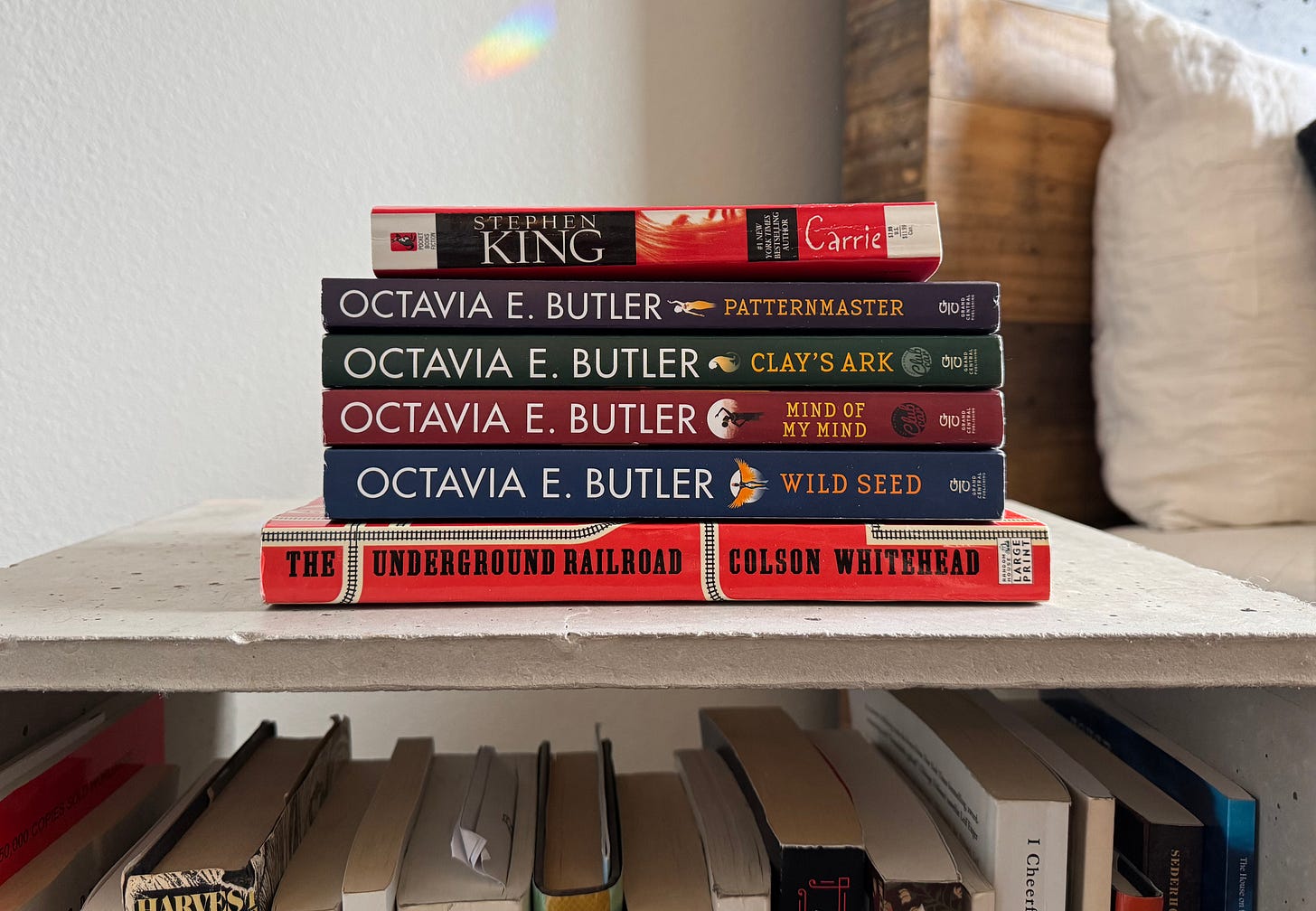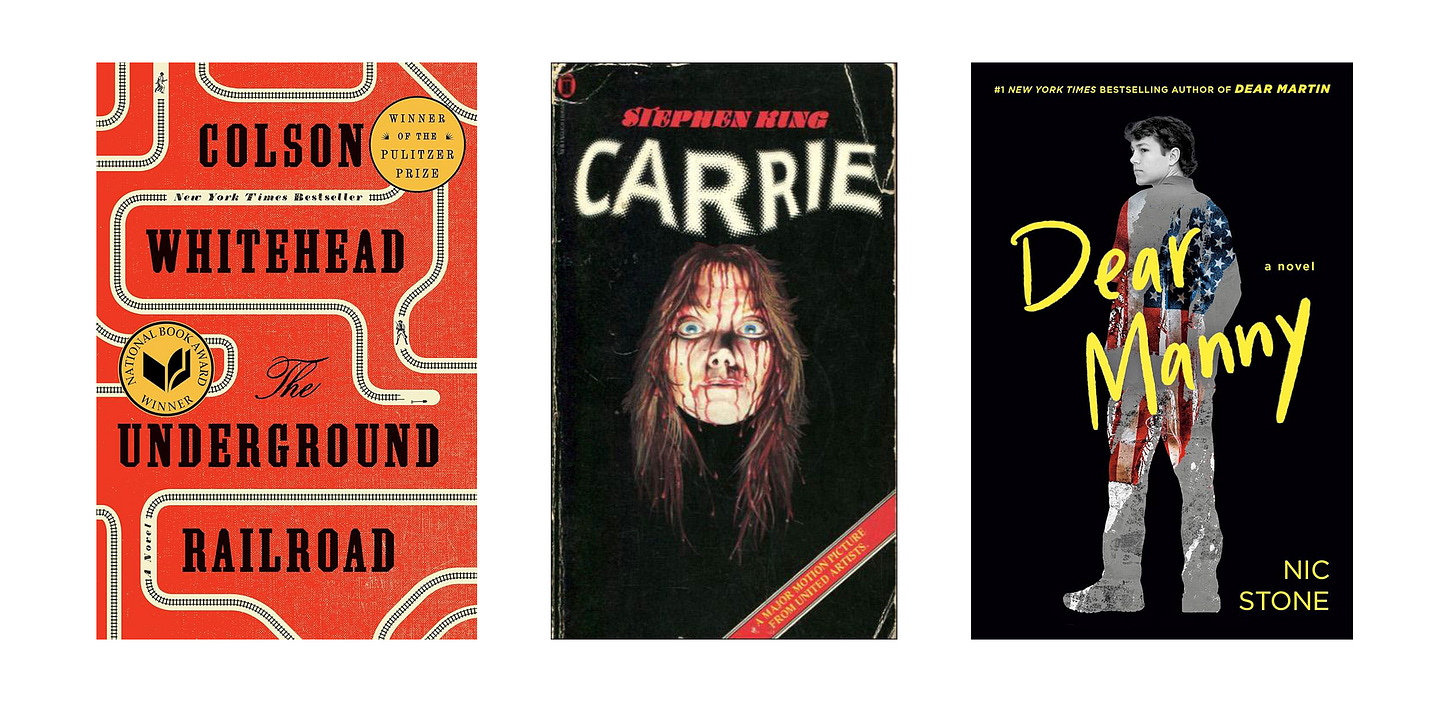What I Read, January 2025
Murderous teens, alien sex, two debuts, a disowned novel, and a Pulitzer winner.
It’s a new year! Which means new reading goals.
My goals for 2025: read all of Octavia E Butler’s work, read one Stephen King book every quarter (TSCA2), and read Peig, the autobiography of my mother’s great-great-great-(etc)-aunt.
Here’s what I read this month.
Underground Railroad - Colson Whitehead
Whitehead brilliantly combines fantasy elements with historical reality to paint a riveting picture of the Antebellum Era that has real pace and movement. It’s mostly a page turner and surprisingly epic.
There’s little I could add to the discourse of this awesome novel. As a writer, it’s incredibly instructive. I’m currently obsessed with the employment of episodic structure in fiction - noticing that the greats, and the stories that last, all employ episodes. It’s especially evident in Underground Railroad.
Dear Manny - Nic Stone
Nic’s upcoming conclusion to her blockbuster series centers a little white boy!
Jared Peter Christensen, a tertiary character from the preceding two entries, now Justyce’s college roommate, is goaded to run for class president in hopes of stopping a radical conservative from enacting regressive reform. But when another student throws her hat in the ring (a student who he’s romantically interested in and might be a more effective legislator), his journey becomes deeply complicated.
I can’t say anything else, but take it from me: Nic Stone is going to have a big year. Read Dear Manny when it releases on March 4 and stay tuned. I’m so excited for her.
Carrie - Stephen King
I’m reading through all the King books I haven’t before, chronologically, one per quarter (TSCA21), which means: Carrie first! Earlier, I wrote about how every Carrie movie gets the book basically wrong. You can check that out here. I had already seen three of the four Carrie movies, but was still constantly surprised by the book. If you haven’t read it yet, you don’t know the story.
As his debut, Carrie is unlike any other King I’ve read. He’s obviously figuring out the craft of book-making for the first time. Even comparing Carrie to ‘Salem’s Lot (his second) you can see that he hasn’t quite figured out his voice yet. He’s reliant on adverbs in Carrie, and the structure is not signature to King at all. The whole book is a combination of narrative mixed with clips of articles, books, and interviews from the world of the story. It’s almost like a narrative non-fiction, post-facto documentary.
It’s a surprisingly quick read, and definitely worth it. It’s iconic for a reason.
The Patternist Series - Octavia E Butler
I’m reading all of Butler this year (here’s why).
I love that this series is mostly stand-alone novels.2 They’re all connected, all in the same universe, but with few exceptions they follow very different characters with little overlap. There’s even a jaunt off planet if you include the disowned Survivor and the posthumously published short story, “A Necessary Being”.
I wish more series were structured as alone novels in the same universe. It’s a lot of fun.
Wild Seed (1980)
When two immortal beings converge in 17th century Africa, they begin a centuries-spanning conflict of love, death, and morality, each building a world that satisfies but through wildly different methods.
Wild Seed starts a little slow, but by the second act you can really see Butler in her creative power. This is Butler’s fifth book and we benefit from her expertise at this point in her career. There’s a sense of ease in her writing that manages themes of abuse, power, and mortality, without getting heavy-handed. While not my favorite of the series, I think this is probably her best Patternist book.
Mind of My Mind (1977)
When a uniquely powered telepath comes into her power she has the opportunity to overthrow the dynamics that have kept her world in place for millennia. But it means taking on her immortal creator whose subjugation has never truly been tested.
Mind of My Mind has the most overlap with any other book in the series - it’s a beautiful follow up to Wild Seed. It has great movement. The book is centered on a different protagonist but completes the journeys of a few characters that were introduced in the preceding book.
Clay’s Ark (1984)
When an alien pandemic crashes on Earth, the afflicted battle their new, sick impulses to stop the spread, but their delicate balance of humanity and hunger is about boiling over.
The last written book of the series, it was also my least favorite. The narrative structure doesn’t benefit the story. The middle third of the book hides from narrative tension and lacks propulsion which makes it a bit of a slog. But the first and final thirds are much more exciting.
Survivor (1978)
A group of missionaries escape the Earth and land on a new planet where two warring native tribes have been locked in stalemate for a generation. One missionary’s love for a native leader may tip the balance forever.
Butler disowned this book, pulling it from publication after a couple years, and it’s too bad because it is a lot of fun. She spoke on why she pulled it, and I can see what she’s talking about. It is problematic, with some shockingly regressive moments (the volume of accepted domestic violence is wild), but it’s paced beautifully, incredibly exciting, and has just enough of a romance to add some spice without throwing the gravity totally off.
Yes, there is alien sex.
If you can get your hands on a copy (check your library if you don’t want to pay $1,000 for a copy on eBay), I highly suggest picking it up.
Patternmaster (1976)
Planet Earth is locked in war between telepathic humans and mutants shaped by an alien epidemic. The Patternmaster, who holds all humans together, is soon to die, pitting his two most powerful children against each other to inherit his unbelievable power.
Patternmaster was Butler’s debut novel, and it feels like a debut (not derogatory!). It’s plot-forward and wildly imaginative. She’s painting with broader brushes and using a smaller palette as a craftsperson, but her capacity for invention is legitimately breathtaking.
Its placement as the final novel in the series undercuts the impact of the imagination on the page that a reader would otherwise get if this were their introduction to her. So if you read other Butler first, keep in mind that this was her debut. It makes the impact of her raw talent that much more impressive.
What I’m reading in February:
Mickey7 - Edward Ashton. The basis of the upcoming Bong Joon-Ho movie, Mickey 17. There is a sequel to this novel, so we’ll see how I feel about attacking that after this one.
Octavia E Butler’s Lilith’s Brood trilogy. Since I’m reading Butler in mostly chronological order (leaving rereads for the end), Lilith’s Brood is next. I don’t know much about it, but the title hints that it’s at least a little bit about eugenics, as the Patternist series was.
Dawn - Octavia E Butler
Adulthood Rites - Octavia E Butler
Imago - Octavia E Butler
One Day, Everyone Will Have Always Been Against This - Omar El Akkad. This is non-fiction, about Palestine and the West, and comes out at the very end of the month. I hope I can get it in under the wire. If not, you’ll see it on my March list. Also, in looking up this book I found El Akkad’s book American War which seems similar to the book I’m writing right now, so I’m going to try to sneak that in, too.
The Stand counts as two.
A note on reading order: this series can be read in a number of ways. I’ve listed them in story chronology, the order I read them in. But they were written in a totally different order, as you can see from the publication years included. There’s no correct way.





